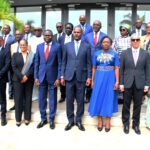The World Bank issued on Thursday, July 14, 2022, a first sustainable development bond of 22.09 billion CFA francs. This fundraising, due in July 2027, is part of its dialogue with investors on the importance of road safety.
Road safety is an important development challenge as road traffic accidents are the leading cause of death in the world among children and young people aged 5-29 years. The World Bank, in collaboration with member countries, is working to put in place transport policies and systems that increase safety and reduce road fatalities. The Bank supports programmes and activities in its member countries to achieve positive social and environmental impact in line with its “twin objectives” of eradicating extreme poverty and promoting shared prosperity. These “twin goals” are aligned with the Sustainable Development Goals (SDGs). Improving the safety of transport systems contributes directly to SDG 3 (Good health and well-being) and SDG 11 (Sustainable cities and communities). For example, the Bretton Woods Institution issued a sustainable development bond worth $50 million, or more than Fcfa 22.09 billion. These investments that integrate road safety also contribute to many other SDGs by saving lives, preserving human capital and fostering economic development.
“Safe System” Approach
The World Bank is implementing a “safe system” approach to supporting road safety in its member countries. This strategy includes strengthening the capacity of countries to design and implement effective road safety interventions and to create a comprehensive road safety management system at the national level. Indeed, the World Bank’s obligations support the financing of programs that advance the Sustainable Development Goals (SDGs). They are consistent with the guidelines on sustainable bonds issued by the International Capital Market Association and, as such, support the financing of a combination of green and social projects, programmes and activities, i.e. “sustainable development”, in IBRD member countries, as described in the World Bank’s Sustainable Development Obligations Framework. The World Bank is also a member of the Executive Committee of the Green Bond, Social Bond and Sustainability Bond Principles. A key priority of the World Bank’s engagement in capital markets is to establish strategic partnerships with investors to promote the importance of private sector financing for sustainable development. The report on the impact of sustainable development obligations describes how the World Bank engages with investors on the SDGs and sensitizes them to specific development challenges.



